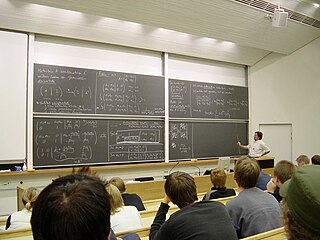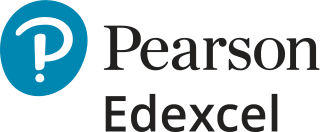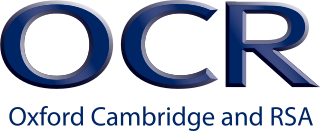The General Certificate of Secondary Education (GCSE) is an academic qualification in a particular subject, taken in England, Wales, and Northern Ireland. State schools in Scotland use the Scottish Qualifications Certificate instead. Private schools in Scotland may choose to use an alternative qualification.
The Leaving Certificate Examination, commonly referred to as the Leaving Cert, is the final exam of the Irish secondary school system and the university matriculation examination in Ireland. It takes a minimum of two years' preparation, but an optional Transition Year means that for those students it takes place three years after the Junior Certificate Examination. These years are referred to collectively as "The Senior Cycle." Most students taking the examination are aged 16–20; in excess of eighty percent of this group undertake the exam. The Examination is overseen by the State Examinations Commission. The Leaving Certificate Examinations are taken annually by approximately 55,000 students.

In contemporary education, mathematics education is the practice of teaching and learning mathematics, along with the associated scholarly research.

The Scottish Qualifications Authority is the executive non-departmental public body of the Scottish Government responsible for accrediting educational awards. It is partly funded by the Education and Lifelong Learning Directorate of the Scottish Government, and employs approximately 750 staff based in Glasgow and Dalkeith.
Standard Grades were Scotland's educational qualifications for students aged around 14 to 16 years. Introduced in 1986, the Grades were replaced in 2013 with the Scottish Qualifications Authority's National exams in a major shake-up of Scotland's education system as part of the Scottish Credit and Qualifications Framework overhaul.
In the Scottish secondary education system, the Higher is one of the national school-leaving certificate exams and university entrance qualifications of the Scottish Qualifications Certificate (SQC) offered by the Scottish Qualifications Authority. It superseded the old Higher Grade on the Scottish Certificate of Education (SCE). Both are normally referred to simply as "Highers".

Edexcel is a British multinational education and examination body formed in 1996 and wholly owned by Pearson plc since 2005. It is the only privately owned examination board in the United Kingdom. Its name is a portmanteau term combining the words education and excellence.
The Advanced Extension Awards are a type of school-leaving qualification in England, Wales and Northern Ireland, usually taken in the final year of schooling, and designed to allow students to "demonstrate their knowledge, understanding and skills to the full". Currently, it is only available for Mathematics and offered by the exam board Edexcel, who renewed their specification in 2018.

OCR is an examination board that sets examinations and awards qualifications. It is one of England, Wales and Northern Ireland's five main examination boards.

The International General Certificate of Secondary Education is an English language based examination similar to GCSE and is recognized in the United Kingdom as being equivalent to the GCSE for the purposes of recognizing prior attainment. It was developed by University of Cambridge International Examinations. The examination boards Edexcel and Oxford AQA also offer their own versions of International GCSEs. Students normally begin studying the syllabus at the beginning of Year 10 and take the test at the end of Year 11. However, in some international schools, students can begin studying the syllabus at the beginning of Year 9 and take the test at the end of Year 10.
Further Mathematics is the title given to a number of advanced secondary mathematics courses. The term "Higher and Further Mathematics", and the term "Advanced Level Mathematics", may also refer to any of several advanced mathematics courses at many institutions.
The Group 5: Mathematics subjects of the IB Diploma Programme consist of two different mathematics courses, both of which can be taken at Standard Level (SL) or Higher Level (HL). To earn an IB Diploma, a candidate must take either Mathematics Applications and Interpretation (SL/HL) or Mathematics Analysis and Approaches (SL/HL).
Free-standing Mathematics Qualifications (FSMQ) are a suite of mathematical qualifications available at levels 1 to 3 in the National Qualifications Framework – Foundation, Intermediate and Advanced.
The A Level is a subject-based qualification conferred as part of the General Certificate of Education, as well as a school leaving qualification offered by the educational bodies in the United Kingdom and the educational authorities of British Crown dependencies to students completing secondary or pre-university education. They were introduced in England and Wales in 1951 to replace the Higher School Certificate. A number of countries, including Singapore, Uganda, Kenya, Mauritius and Zimbabwe have developed qualifications with the same name as and a similar format to the British A Levels. Obtaining an A Level, or equivalent qualifications, is generally required for university entrance, with universities granting offers based on grades achieved.
Advanced Level (A-Level) Mathematics is a qualification of further education taken in the United Kingdom. In the UK, A-Level exams are traditionally taken by 17-18 year-olds after a two-year course at a sixth form or college. Advanced Level Further Mathematics is often taken by students who wish to study a mathematics-based degree at university.
The General Certificate of Education (GCE) Advanced Level, or A Level, is a main school leaving qualification in England, Wales, Northern Ireland, the Channel Islands and the Isle of Man. It is available as an alternative qualification in other countries.
Additional Mathematics is a qualification in mathematics, commonly taken by students in high-school. It is applied to a range of problems set out in a different format and wider content to the standard Mathematics at the same level.
A high school diploma is a North American academic school leaving qualification awarded upon high school graduation. The high school diploma is typically obtained after a course of study lasting four years, from grade 9 to grade 12. The diploma is awarded by the school in accordance with the requirements of the local state or provincial government. Requirements for earning the diploma vary by jurisdiction, and there may be different requirements for different streams or levels of high school graduation. Typically they include a combination of selected coursework meeting specified criteria for a particular stream and acceptable passing grades earned on the state exit examination.
Though basic numeracy is taught at a earlier age, Mathematics education in the United Kingdom is largely carried out at ages 11–16 at secondary school. However voluntary Mathematics education in the UK takes place from 16-18, in sixth forms and other forms of further education. Whilst adults can study the subject at universities and higher education more widely. Mathematics education is not taught uniformly as exams and the syllabus vary across the countries of the United Kingdom, notably Scotland.

Science education in England is generally regulated at all levels for assessments that are England's, from 'primary' to 'tertiary' (university). Below university level, science education is the responsibility of three bodies: the Department for Education, Ofqual and the QAA, but at university level, science education is regulated by various professional bodies, and the Bologna Process via the QAA. The QAA also regulates science education for some qualifications that are not university degrees via various qualification boards, but not content for GCSEs, and GCE AS and A levels. Ofqual on the other hand regulates science education for GCSEs and AS/A levels, as well as all other qualifications, except those covered by the QAA, also via qualification boards. The Department for Education prescribes the content for science education for GCSEs and AS/A levels, which is implemented by the qualification boards, who are then regulated by Ofqual. The Department for Education also regulates science education for students aged 16 years and under. The department's policies on science education are implemented by local government authorities on all state schools in England. The content of the nationally organised science curriculum for England is published in the National Curriculum, which covers key stage 1 (KS1), key stage 2 (KS2), key stage 3 (KS3) and key stage 4 (KS4). The four key stages can be grouped a number of ways; how they are grouped significantly affects the way the science curriculum is delivered. In state schools, the four key stages are grouped into KS1–2 and KS3–4; KS1–2 covers primary education while KS3–4 covers secondary education. But in independent or public schools, the key stage grouping is more variable, and rather than using the terms ‘primary’ and 'secondary’, the terms ‘prep’ and ‘senior’ are used instead. Science is a compulsory subject in the National Curriculum of England, Wales and Northern Ireland; state schools have to follow the National Curriculum while independent schools need not follow it. That said, science is compulsory in the Common Entrance Examination for entry into senior schools, so it does feature prominently in the curricula of independent schools. Beyond the National Curriculum and Common Entrance Examination, science is voluntary, but the government of the United Kingdom provides incentives for students to continue studying science subjects. Science is regarded as vital to the economic growth of the United Kingdom (UK). For students aged 16 years and over, there is no compulsory nationally organised science curriculum for all state/publicly funded education providers in England to follow, and individual providers can set their own content, although they often get their science courses accredited or made satisfactory. Universities do not need such approval, but there is a reason for them to seek accreditation regardless. Moreover, UK universities have obligations to the Bologna Process to ensure high standards. Science education in England has undergone significant changes over the centuries; facing challenges over that period, and still facing challenges to this day.





